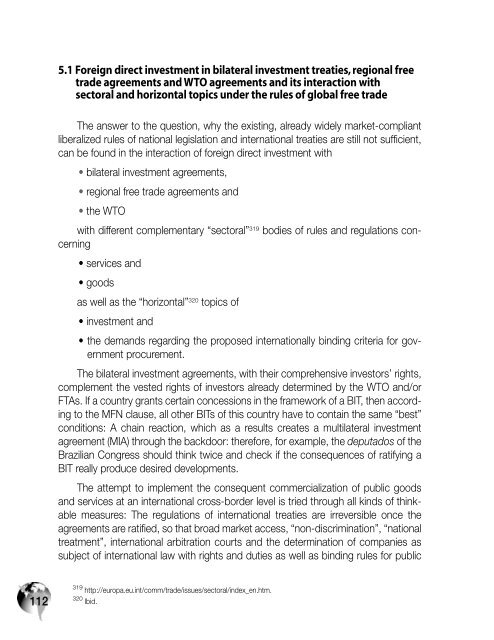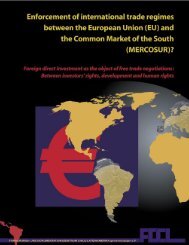Download - FDCL
Download - FDCL
Download - FDCL
You also want an ePaper? Increase the reach of your titles
YUMPU automatically turns print PDFs into web optimized ePapers that Google loves.
112<br />
5.1 Foreign direct investment in bilateral investment treaties, regional free<br />
trade agreements and WTO agreements and its interaction with<br />
sectoral and horizontal topics under the rules of global free trade<br />
The answer to the question, why the existing, already widely market-compliant<br />
liberalized rules of national legislation and international treaties are still not sufficient,<br />
can be found in the interaction of foreign direct investment with<br />
• bilateral investment agreements,<br />
• regional free trade agreements and<br />
• the WTO<br />
with different complementary “sectoral” 319 bodies of rules and regulations concerning<br />
• services and<br />
• goods<br />
as well as the “horizontal” 320 topics of<br />
• investment and<br />
• the demands regarding the proposed internationally binding criteria for government<br />
procurement.<br />
The bilateral investment agreements, with their comprehensive investors’ rights,<br />
complement the vested rights of investors already determined by the WTO and/or<br />
FTAs. If a country grants certain concessions in the framework of a BIT, then according<br />
to the MFN clause, all other BITs of this country have to contain the same “best”<br />
conditions: A chain reaction, which as a results creates a multilateral investment<br />
agreement (MIA) through the backdoor: therefore, for example, the deputados of the<br />
Brazilian Congress should think twice and check if the consequences of ratifying a<br />
BIT really produce desired developments.<br />
The attempt to implement the consequent commercialization of public goods<br />
and services at an international cross-border level is tried through all kinds of thinkable<br />
measures: The regulations of international treaties are irreversible once the<br />
agreements are ratified, so that broad market access, “non-discrimination”, “national<br />
treatment”, international arbitration courts and the determination of companies as<br />
subject of international law with rights and duties as well as binding rules for public<br />
319 http://europa.eu.int/comm/trade/issues/sectoral/index_en.htm.<br />
320 Ibid.









